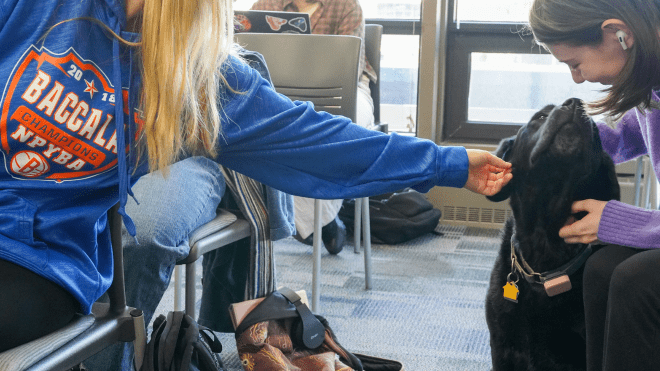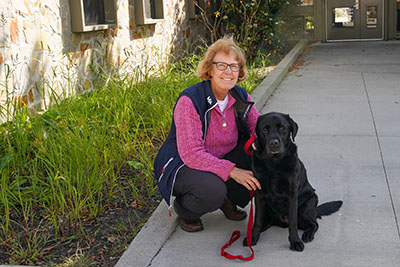A Round of ‘A-Paws’ for RWU’s New Animal-Assisted Therapy Class
Psychology students gain hands-on experience, learning how animals can be a source of therapy, with help from certified therapy dog Harper.

BRISTOL, R.I. – Life isn’t so “ruff” in this Roger Williams University Psychology classroom. Students peek under their desks to find a furry friend with four paws, a wagging tail, and a face that is waiting for a belly rub. This furry friend's name is Harper, a six-year-old Labrador retriever who is a certified therapy animal that is an integral part of Claire Wiseman's Animal-Assisted Therapy class.
Wiseman, a clinical psychologist, and adjunct professor at RWU, has worked with animals in a school setting since 2006 and launched her Animal-Assisted Therapy course at RWU this semester to teach students about the benefits of therapy animals and help shape what path they may take as psychologists. Wiseman, who has expertise in eating disorders, said she has found that dogs have historically helped her clients tremendously.
Wiseman hopes to spread knowledge about the proven scientific effects of pet therapy on people’s mental health and wellness. By teaching this course to future psychologists, it gives them a glimpse into an alternative treatment they may not have considered otherwise.

“Psychologists need to consider the benefits of animals much more than we do. We’re very quick to put people on medicine, but having animal therapy as an alternative could yield amazing results,” said Wiseman, founder of the Red Skye Foundation, which supports all types of animal therapy, from dogs to horses. “Petting Harper for just three minutes, you start to secrete oxytocin, which is a precursor to serotonin, so you feel less anxious and depressed."
In the classroom, the students all greet Harper with smiles and a pat on the head as they walk to their seats. Harper has free range of the room as she goes around from student to student looking for a connection. The joy that radiates from the students is contagious.

Alyssa Vatalaro, a junior majoring in Forensic Science and minoring in Psychology and Criminal Justice, said she took this class to learn more about the benefits of animals and how they can assist in healing patients' illnesses.
“I’m happy Roger offers this class,” said Vatalaro, of Wantage, N.J. “I think it’s a good addition to the Psychology department. I love having Harper in the classroom.”
Vatalaro said she’s excited to apply what she learns in this class to her future career.
“I am looking into pursuing forensic psychology and possibly working with victims. Animal-assisted therapy has helped patients with anxiety, stress, and post-traumatic stress disorder,” said Vatalaro, who added that she loves dogs. “I would love to work with animal-assisted therapy for patients and see how it helps them succeed.”